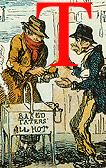 ennyson and Dickens both use setting, more specifically description of rooms as a technique to describe different states of being. For example, in “The Palace of Art" the description of the different rooms corresponds to the changing states of the soul. Whereas the “dark and red" room may correspond to an anxious, frustrated soul, the room depicting “iron coast and angry waves" may correspond to an angry soul. Similarly in Great Expectations, setting determines the characters' states of mind. For example, the description of Miss Havisham's room also describes her character: “I entered, therefore, and found myself in a pretty large room, well lighted with wax candles. No glimpse of daylight was to be seen in it. . .It was then I began to understand that everything in the room had stopped, like the watch and the clock, a long time ago" (ch. 8; 87-89). Miss Havisham's room has no connection with life. The only light it receives is artificial. Furthermore, it is the same as it was years ago, with the same bridal cake, stuck in the past, demonstrated by the suspension of time. Likewise, life has escaped Miss Havisham who, dressed in her faded bridal dress, never sees daylight and lives in the past. The environment of decay, this “standing still of all the pale decayed objects" (90), parallels Miss Havisham's decay as she leads the life of a living dead. The description of Jaggers's house likewise reflects Jaggers's character:
ennyson and Dickens both use setting, more specifically description of rooms as a technique to describe different states of being. For example, in “The Palace of Art" the description of the different rooms corresponds to the changing states of the soul. Whereas the “dark and red" room may correspond to an anxious, frustrated soul, the room depicting “iron coast and angry waves" may correspond to an angry soul. Similarly in Great Expectations, setting determines the characters' states of mind. For example, the description of Miss Havisham's room also describes her character: “I entered, therefore, and found myself in a pretty large room, well lighted with wax candles. No glimpse of daylight was to be seen in it. . .It was then I began to understand that everything in the room had stopped, like the watch and the clock, a long time ago" (ch. 8; 87-89). Miss Havisham's room has no connection with life. The only light it receives is artificial. Furthermore, it is the same as it was years ago, with the same bridal cake, stuck in the past, demonstrated by the suspension of time. Likewise, life has escaped Miss Havisham who, dressed in her faded bridal dress, never sees daylight and lives in the past. The environment of decay, this “standing still of all the pale decayed objects" (90), parallels Miss Havisham's decay as she leads the life of a living dead. The description of Jaggers's house likewise reflects Jaggers's character:
Rather a stately house of its kind, but dolefully in want of painting, and with dirty windows. He took out his key and opened the door, and we all went into a stone hall, bare, gloomy, and little used. So up a dark brown staircase into a series of three dark brown rooms...The furniture was all very solid and good, like his watch-chain. It had an official look, however, and there was nothing merely ornamental to be seen. [ch. 26]
The stateliness of the house reflects his elevated position in society as a renowned lawyer. The lack of mere ornamentation in his house tells us that unlike Wemmick, he does not distinguish his public and private life. The dirtiness of the windows, and the darkness of the rooms reflect the questionable aspect of his business. In fact, the text frequently depicts Jaggers as “washing his hands with scented soap" (ch.26) as if trying to get rid of the guilt of defending shady characters.
[The initial “T" is based on George Cruikshank's Comic Alphabet.]
Last modified 1996